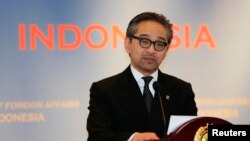In an annual speech on Monday, Indonesian Foreign Minister Marty Natalegawa again spoke of his country's relationship with Australia after a rift over reports Canberra spied on its officials.
Natalegawa acknowledged that Indonesia's relationship with Australia was still in a “difficult phase.” He said he was in daily contact with Australia's foreign minister, Julie Bishop, in an effort to repair the damage.
“What's needed is a gradual process of restoration of confidence, of trust, and this is where we are just now,” said Natalegawa.
He also expressed confidence that the relation would get back on track.
“I am of the view that this is an aberration and not the rule, and that in due course the relation will be back to where it has been in the recent past,” he added.
The foreign minister again warned Australia not to turn back asylum seeker boats, an especially prickly issue after a stand-off in November when Australia tried to force a vessel back into Indonesian waters.
“Let me just once again put on record our rejection of the policy that resembles pushing back the boat. Because such a policy is not actually conducive to a comprehensive solution to the issue,” said Natalegawa.
In November’s incident the Australian government backed down after Indonesia refused to accept the asylum seekers, who were eventually transferred to Christmas Island.
Also complicating relations between Jakarta and Canberra lately has been reports of Australian spying on Indonesia, including monitoring the phone calls of Indonesian President Susilo Bambang Yudhoyono, the first lady, the vice president and other senior ministers. The spying allegations were first reported in Australian media after documents leaked by whistleblower Edward Snowden were made available.
Indonesia suspended military cooperation with Australia over the alleged spying, which is said to have taken place in 2009.
The row has strained relations between the two allies, whose relationship includes cooperation on asylum seekers and anti-terror efforts.
Natalegawa acknowledged that Indonesia's relationship with Australia was still in a “difficult phase.” He said he was in daily contact with Australia's foreign minister, Julie Bishop, in an effort to repair the damage.
“What's needed is a gradual process of restoration of confidence, of trust, and this is where we are just now,” said Natalegawa.
He also expressed confidence that the relation would get back on track.
“I am of the view that this is an aberration and not the rule, and that in due course the relation will be back to where it has been in the recent past,” he added.
The foreign minister again warned Australia not to turn back asylum seeker boats, an especially prickly issue after a stand-off in November when Australia tried to force a vessel back into Indonesian waters.
“Let me just once again put on record our rejection of the policy that resembles pushing back the boat. Because such a policy is not actually conducive to a comprehensive solution to the issue,” said Natalegawa.
In November’s incident the Australian government backed down after Indonesia refused to accept the asylum seekers, who were eventually transferred to Christmas Island.
Also complicating relations between Jakarta and Canberra lately has been reports of Australian spying on Indonesia, including monitoring the phone calls of Indonesian President Susilo Bambang Yudhoyono, the first lady, the vice president and other senior ministers. The spying allegations were first reported in Australian media after documents leaked by whistleblower Edward Snowden were made available.
Indonesia suspended military cooperation with Australia over the alleged spying, which is said to have taken place in 2009.
The row has strained relations between the two allies, whose relationship includes cooperation on asylum seekers and anti-terror efforts.





